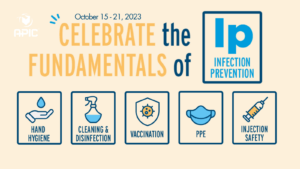Infection prevention is one of the standards of nursing practice. Keeping infections from starting or from being passed along through contact is essential to keeping nurses and patients healthy. International Infection Prevention Week (this year marked on October 15-21) is an annual event to highlight the best practices to prevent infection and to bring awareness to the issue of infection prevention.
Infections are largely preventable, Marie Wilson, MSN, RN, CIC, FAPIC, an infection preventionist in the Quality Division of Fred Hutchinson Cancer Center, and a chair of the communications committee for the Association for Professionals in Infection Control and Epidemiology (APIC). Wilson says her career path was determined in part by her time as an ICU nurse. “I saw too many patients become afflicted with infections as a result of the disease process or from care,” she says.
Education, says Wilson, is one of the top ways to help stop infection from spreading. “We saw a glimpse of this in the beginning of the pandemic,” says Wilson. There were constant reminders of hand washing, social distancing, and covering your face to prevent the spread of disease. “Those are all things we became very familiar with,” she says.
Hand hygiene continues to be one of the most important actions in infection prevention, says Wilson. For nurses, hand washing is a focused, professional step in patient care. What is important to remember? “Taking the time to observe the five moments of hand hygiene when you are interacting with patients and washing your hands at the right time,” says Wilson. When nurses do this, they model the right behavior for peers, patients, and their families as well.
But putting the best approaches into practice isn’t always perfect. Misinformation can work against infection prevention, even despite the best intentions. For instance, Wilson says there’s no need to reuse personal protective gear or masks when there’s not a shortage. Now, she says, supplies are available, so using new items is the best option. And wearing two masks, like a mask over an N95 that has been fit tested, can actually worsen any infection prevention as the top mask can negatively impact the fit of the N95.
Sometimes Wilson says she sees gloves used as a replacement for hand hygiene which is not effective for infection prevention.
And in a chaotic environment, nurses can forget to wash their hands. Or they might use an alcohol-based hand rub out of eyesight of a patient who then asks the nurse to wash their hands for reassurance. “Be receptive to feedback,” says Wilson. And although there seems to be debate about alcohol-based hand sanitizer versus soap and water for effectiveness, Wilson says they each are excellent–the biggest issue is to just use them. “In a healthcare setting, alcohol-based hand rub is preferable,” she says. “It’s easy to do and effective. When the hands are visibly soiled, use soap and water as the hand rub may not penetrate the heavily soiled areas.”
In addition to hand hygiene, cleaning and disinfecting areas with proper disinfectants keeps germs from spreading. But, says Wilson, be sure to know what you are using so it is the most effective cleanser and be extra careful to never mix cleaning agents. This is a great safety rule for nurses to pass along to patients, as the fumes created from mixing solutions that contain bleach and ammonia can be deadly.
Vaccines are also a top way to prevent disease and infection for individuals themselves and for the greater public. “They are so highly effective and protect people,” says Wilson.
Infection prevention has some basic actions, but the layers of it are complex and require constant attention. Wilson says she is grateful for all nurses do to help control infection and their persistence through the hardship, staff turnover, and burnout nurses have endured in the past few years. Their work continues to make a difference in infection prevention.
- A Camp Nurse Volunteer Shares the Joy - April 30, 2024
- Is the FNP Program Right for You? - April 24, 2024
- WOC Nurses Week Highlights Specialty - April 16, 2024



